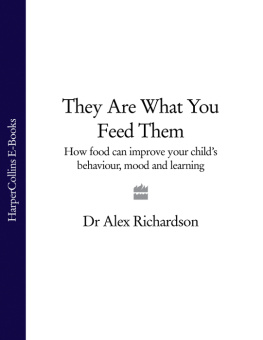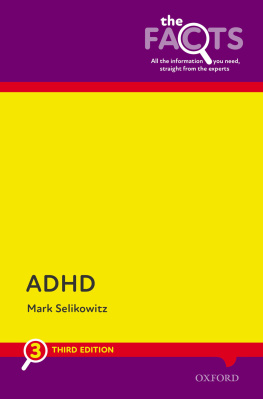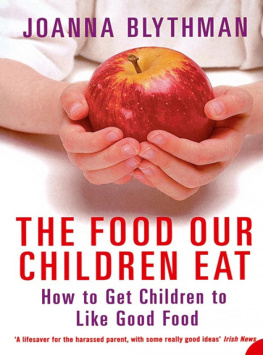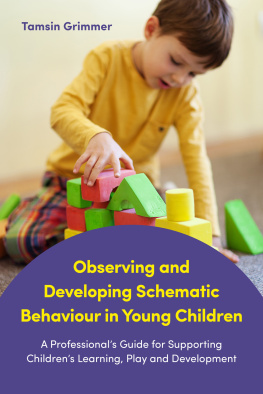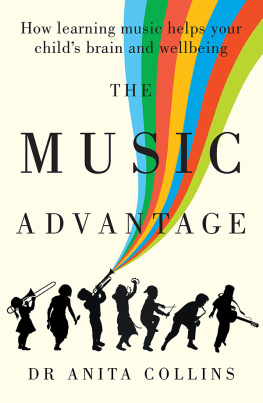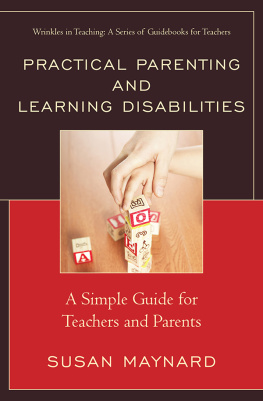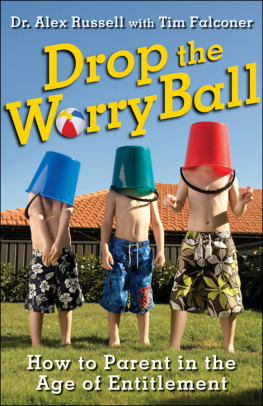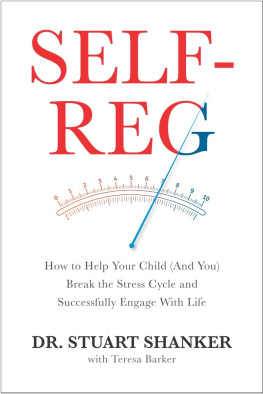Chapter 1
Starting Points
Who Will Benefit from Reading this Book?
Ive written this book primarily for those of you who are parents and carers, and the information and advice have been tailored accordingly. Parents or guardians are usually the ones who have most responsibility for and influence over their childrens development, at least in the early years, and this is particularly true when it comes to food and diet. What parents dont usually have, however, is easy access to reliable information about just how important good nutrition is to their childs developmentand especially to their childs brain and behaviour.
Having said that, many of the parents Ive met have taught me a great deal about the links between food and behaviour, and in this book Ill be doing my best to share with you the insights Ive gained from working with these parents and their children. Many of them know a great deal more about this subject than most specialists in child behaviour, and Ive sprinkled quotes from them throughout the book. They have often gained their knowledge the hard way, however, and sadly the professionals officially in charge of helping them and their children have not always been receptive to suggestions that diet could in any way be relevant to these childrens difficulties in behaviour, learning or mood.
This book is about you taking charge and helping your child and yourself.
For this reason, although this book is written mainly for parents, I hope that the material here will also be useful to the many practitioners in health, education, social services or other fields who are struggling to help the children in their care, as well as to the many support groups and charities whose invaluable work has been helping to fill the huge gaps left by official research, policy and practice. In my experience, it is parents, along with some professionals and support groups, who have often been the unsung heroes who have actually made some of the most important discoveries about how diet can affect childrens behaviour. Science is only just starting to follow up some of these discoveriesand, as usual, government policy tends to lag way behind.
Why I Have Written This Book
For almost 20 years now Ive been involved in scientific research into the nature and causes of many common difficulties in behaviour and learning. The children affected may have been labelled with terms like dyslexia, dyspraxia, ADHD or autism. In many cases there is no official diagnosisand even when there is, this doesnt always lead to effective solutions. For those who know what to look out for, the first signs of conditions like dyslexia, ADHD or other syndromes are there from early childhood, but these are not always recognized until much laterif at allwhile the effects of the unexpected difficulties with behaviour and learning usually last a lifetime. They can also cause untold distress and misery if not properly identified and treated.
Early recognition, along with effective help, can make all the difference.
My primary aim as a researcher has always been to find better ways of identifying and helping people whose lives are affected by these kinds of difficulties. From my earlier background in teaching I first became aware of just how many children were actually affected, although most of them were not being given the help they really needed. What was preventing most of these children from achieving anything like their true potential, I realized, was our sheer ignorance of how human brains and minds really workespecially with respect to individual differences. This is what led me out of teaching and into the world of neuroscience research. At first, my scientific research had nothing to do with nutritionor so I thought! But that view began to change as I recognized that nutritional issues cut across everything I was studying.
What on Earth Is Really Going On?
In both research and practice in health and education, children who have particular difficulties with behaviour or learning are often diagnosed as having conditions such as ADHD (attention-deficit hyperactivity disorder), dyslexia or specific reading difficulties (SRD), dyspraxia or developmental coordination disorder (DCD) or autistic spectrum disorders (ASD). For children with behavioural problems, conduct disorder and oppositional defiant disorder are the terms commonly applied. Learning difficulties may attract diagnoses such as speech and language disorder.
Unfortunately there is still a great deal of controversy over what these labels actually mean. They may do a good job of describing specific patterns of difficulties that are common to many children, but they do little or nothing when it comes to explaining them. If help is to be effective, then it really is important to know whats actually causing these childrens problems, but this crucial information is not something that any of these diagnoses actually provides.
These so-called developmental disorders also lack any clear boundaries. Not only do they overlap considerably with each other, but their core symptoms also occur in milder forms in so many children in every classroom that it is a matter of opinion (and considerable controversy) where the dividing lines should be drawn. In the UK, around one child in every four or five would now meet the criteria for one or more of these disorders, leading many people to ask, What on earth is really going on?
Diagnostic labels like ADHD or dyslexia can obviously be very useful in some respectsperhaps most importantly because they provide official recognition that a child is not lazy, careless, stupid, selfish or something even worse.
Sadly, these very negative labels are all too often applied by people who know no better. If left unchallengedand particularly if your child starts to believe themsuch labels could obviously do irreparable damage to his or her self-esteem and opportunities in life. Many children and adults have told me what a relief it was when someone finally identified their difficulties as being typical of dyslexia, dyspraxia, ADHD or ASD. A diagnosis may also be invaluable in opening the way to appropriate treatment. In school, it should allow your child access to whatever specialist assistance may be on offer, because the school can probably get extra funding to meet your childs special needs.
The help on offer doesnt usually consider something very fundamental indeed: your childs diet.
Not every child with behavioural or learning problems will necessarily even qualify for any official diagnosis, of course. But even if they do, these officially recognized labels, which parents have often had to fight for years to obtain, dont always lead to the kind of help that parents really want. For instance, if the diagnosis is ADHD, their child will usually be offered treatment with drugs. If the diagnosis is dyslexia, then some special teaching help may be available. If the diagnosis is dyspraxia or DCD, then behavioural therapies or physiotherapy might be offered. And if the diagnosis is an autistic spectrum disorder, parents may well be told that there is nothing anyone can do.
There is always something that can be done. Dont ever believe it if anyone tells you otherwise.
One of the very real and fundamental issues that affects every child, and which every parent would benefit from knowing more about, is nutrition. The problem is that information and advice about food and diet currently feature absolutely nowhere in standard practice for either assessing or treating childrens behavioural and learning difficulties. In my view, this situation is simply indefensible.
As a result of the high profile my work has achieved, I receive thousands of enquiries and requests for advice from parents and professionals. These parents and professionals all have the same concerns and aims I have:

